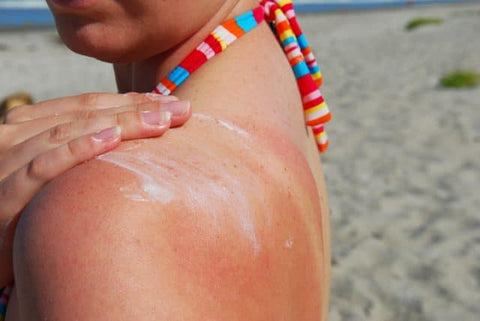10 Summer Skincare Tips Dermatologists Swear By
Each season of the year has different environmental conditions that may affect your skin in some way. Therefore, if you want to take care of your skin as much as possible, COOSEON wants to tell you that you need to adjust your daily routine slightly according to the seasons.
While in winter, dry skin and flushing may be your worst enemy, in summer, you should fear dark spots, oily or dry skin, and lamprey.
Here, we'll give you some summer skin care tips to help your skin better cope with the hottest months of the year, and why not? Make it look and feel more radiant throughout the summer.

In our opinion, health and beauty go hand in hand, so these summer skin care tips from dermatologists won't just focus on cosmetic skin. Some of them are destined to remind you of essential skin health tips that people usually don't know or forget over time.
-
Check your moles

Occasionally, especially if you are a beach addict, it is recommended that you see a dermatologist and have a full body checkup. Your doctor will examine your moles and markings and see how they evolve over time, so you'll know how careful you should be when exposed to the sun based on your particular skin condition. Knowing that you don't have melanoma will make you feel safer and enjoy more summers. In addition, controlling these moles will prevent future problems in this area.
If a mole changes its appearance or becomes larger, be sure to visit your dermatologist.
-
Meet the minimum SPF requirements
It may seem obvious to tell you that you should wear sunscreen in the summer, but it's not easy to know the minimum SPF needed to prevent skin problems.

While SPF 15 is the minimum requirement for skin cancer prevention according to the FDA (Food and Drug Administration), both the European Academy of Dermatology and Venereology (EADV) and the American Academy of Dermatology (AAD) recommend SPF 30 or higher.
In addition, to prevent dark spots and skin photoaging, we recommend using SPF 50+ for every exposure in the summer, not just at the beach.
You can find out which SPF to use depending on your skin photo type in this entry: Determining Your Skin Photo Type.
-
Apply sunscreen 30 or 15 minutes before sun exposure and reapply every 2 hours
You should always apply sunscreen before sun exposure to allow time for it to penetrate your skin and create an invisible barrier that protects you.
In addition, SPF values are tested for how well the sunscreen protects for 2 hours, so there is no guarantee that the cream will be as effective after that.
we recommend reapplying sunscreen after swimming. Most sunscreens are waterproof, which means you can play or exercise in the water for long periods without worrying about skin burns. However, once you're back on the towel and your skin has dried, it's best to reapply in case some of the creams wash off. And it's a good idea to let your sunscreen be mini makeup fridge cooled before use, as this not only extends the life of the sunscreen but also makes your burning skin feel cooler and more comfortable to apply.
-
Leave it in the shade

Bring an umbrella or seek shelter if you're spending the day at the beach. The sun has some important health benefits, but spending hours under it is just too much. If you spend a lot of time on the beach, bring an umbrella with you or seek shelter at a beach bar or under a tree. Plus, we're not just worried about sunburn here; extra care is a must if you want to prevent sun-induced wrinkles and dark spots.
-
Moisturize your skin after the beach
Sun exposure, sand, and salty water can dehydrate your skin. To compensate for the drying effects of these external factors and to balance your skin, we recommend using a cold, highly moisturizing body lotion and facial moisturizer from the mini skincare fridge after your shower.
-
Take a cool shower
Hot showers can dry out your skin even more, so it's best to use warm or cold water to cleanse your skin. In addition, cool water is good for blood flow and skin microcirculation. All in all, turning down the water temperature can be very beneficial to your body and skin.
-
Change clothes after outdoor exercise
Wearing sweaty or wet clothes for long periods of time can create a microenvironment that is friendly to bacteria. It can cause rashes and even lead to a skin condition called folliculitis, in which skin follicles are infected and cause inflammation and red papules around the hair follicles. Preventing folliculitis is as simple as changing your clothes after a sweaty workout.
-
Rejuvenate your skin once a week

Revitalizing masks are great for restoring skin balance, bringing in extra moisture, and enhancing skin elasticity. Choose a mask that helps repair and strengthen the skin barrier. Remember, the skin barrier helps maintain skin balance and protects the skin from external stressors, including bacteria, pollution, reactive oxygen species, etc. Excess sun exposure can weaken your skin barrier, so using a mask once a week can promote its restoration to improve your skin's defense, texture, and appearance.
-
Use antioxidants
UV radiation is a major source of free radicals. These terrible elements can damage our tissues and cause premature aging of the skin (you can learn how free radicals work here). To help protect your skin from its damaging effects, you can add antioxidants to your diet and skin care regimen. All foods rich in vitamin C will provide your body with antioxidants. Its cosmetic form, ascorbic acid, also does the trick. It goes directly to your skin, so it will more specifically prevent photoaging. Specific serums and free radical scavenging peptides may be very helpful. When it comes to preventing oxidative stress, all precautions must be taken. The use of antioxidants can significantly slow down skin aging.
-
Repair skin after sunburn

Wait until fall to follow this tip. If you are extra careful, it is possible that the summer did not cause a little damage to your skin, but this sounds very idle. Usually, after summer, we find that our skin tone is uneven, and our skin is drier than usual. Therefore, autumn is the perfect time to have a facial where you can enjoy a soft peel, your skin will get an overall lift, and the dark spots on your skin will fade away. Let your aesthetician pamper your skin after the beach day!
Learn more about skincare at: COOSEON.COM.
















